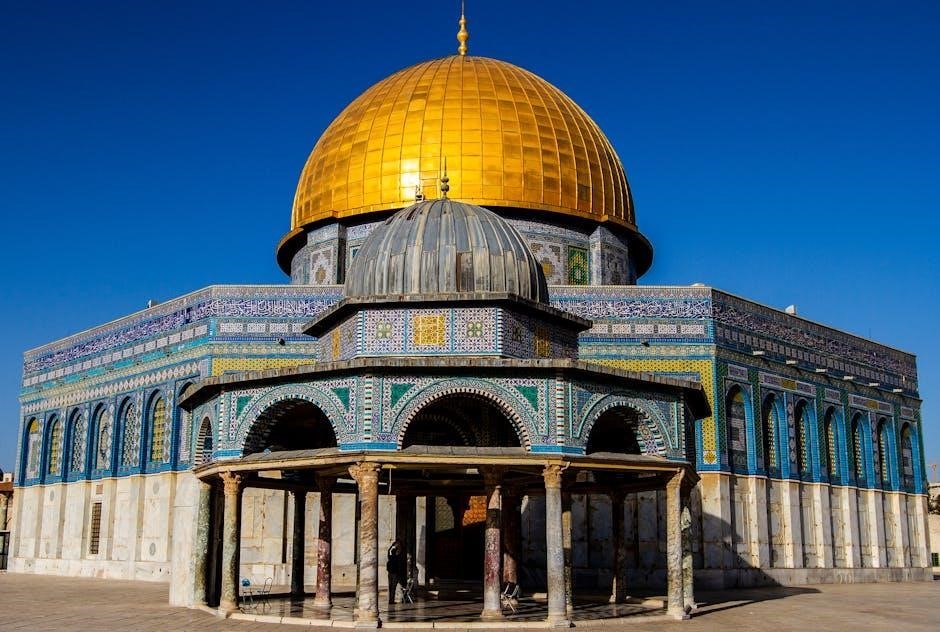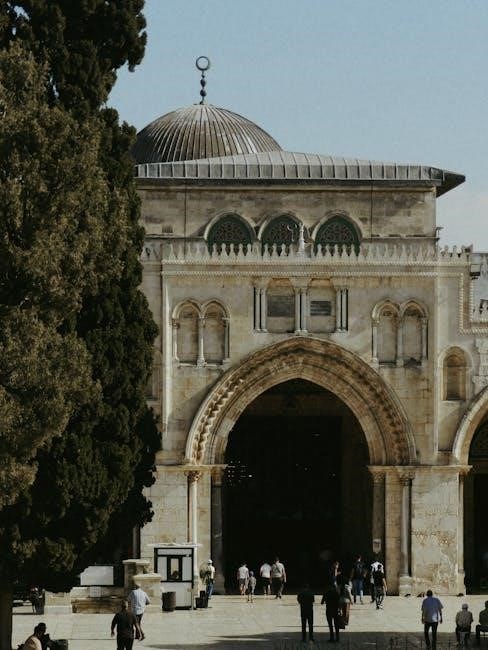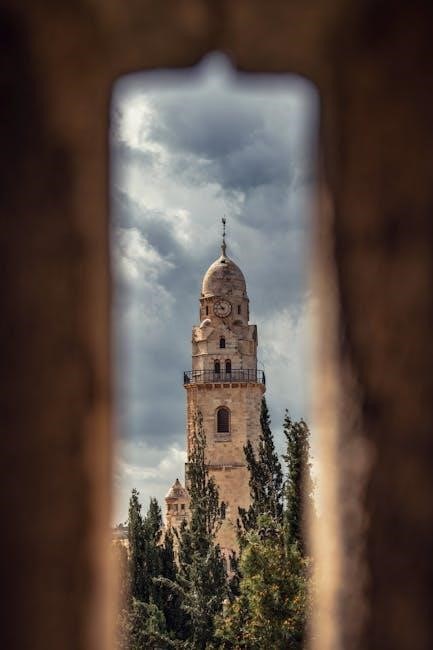
The 12 Gates of Jerusalem symbolize divine government and God’s eternal promises, representing the 12 tribes of Israel․ They signify access to God’s presence and unity between His people, embodying spiritual restoration and heavenly fulfillment․
Historical and Spiritual Context
The 12 Gates of Jerusalem are deeply rooted in biblical history, symbolizing God’s divine plan and governance․ Historically, these gates were part of Jerusalem’s physical structure, controlling entry and exit, and were often destroyed or restored during significant events․ Spiritually, they represent the 12 tribes of Israel, emphasizing God’s covenant with His people․ The gates also foreshadow the New Jerusalem, as described in Revelation, where they signify eternal access to God’s presence․ Their destruction in historical events, like the fall of the Temple, marked spiritual loss, while their restoration symbolizes redemption․ The gates embody transition points into new spiritual seasons, reflecting divine encounters and the unity of God’s people across covenants․

Scriptural References to the 12 Gates
Revelation 21:21 highlights the 12 gates of New Jerusalem, each inscribed with the names of Israel’s tribes․ Ezekiel 48:31-34 describes their distribution, symbolizing divine order and access to God’s presence, while Genesis 28:17 underscores their role as heavenly gateways;
Revelation 21 and Ezekiel’s Vision of the New Jerusalem

In Revelation 21:10-27, the New Jerusalem is described as a heavenly city with 12 gates, each inscribed with the names of Israel’s tribes, symbolizing God’s covenant faithfulness․
Ezekiel’s vision (Ezekiel 40-48) details a restored Jerusalem with 12 gates, each named after the tribes, emphasizing divine order and access to God’s presence․ These visions highlight the unity of God’s people․
Both accounts signify the ultimate fulfillment of God’s kingdom, where believers from all ages gather in harmony, reflecting the eternal promise of access to God’s presence through the 12 gates․
Spiritual Symbolism of the 12 Gates
The 12 gates symbolize divine governance and unity, representing God’s eternal promises and access to His presence, fulfilling His kingdom’s purpose for all believers․
Unity of the Old and New Covenants
The 12 gates of Jerusalem symbolize the unity of God’s people across both covenants, bridging the Old Testament’s promises to Israel with the New Testament’s fulfillment through Christ․ This unity is reflected in the gates and foundations of the New Jerusalem, which together represent the seamless integration of all believers․ The gates, inscribed with the names of the tribes of Israel, signify that God’s redemptive plan began with Israel and continues through the church․ This harmony underscores God’s eternal plan to unite His people under one covenant, fulfilled in Christ, emphasizing His faithfulness and the ultimate restoration of all things․
Biblical Numerology: The Significance of the Number 12

The number 12 in biblical numerology symbolizes God’s divine government and perfect governance․ It appears in Revelation 21 and Ezekiel’s vision, representing completeness and divine order․ The 12 tribes of Israel and the 12 apostles reflect this pattern, signifying God’s plan for His people․ The 12 gates of Jerusalem embody this numerology, representing perfect access to God’s presence and eternal harmony․ This recurring theme underscores the unity and fulfillment of God’s redemptive plan, linking the Old and New Testaments; The number 12, therefore, reflects divine perfection and the ultimate restoration of all things under God’s eternal sovereignty․


Prophetic Significance of the Gates
The 12 Gates of Jerusalem prophesy God’s divine government and the restoration of spiritual discipline, symbolizing transition points into new spiritual seasons and divine encounters, fulfilling His eternal plan․
The Restoration of Spiritual Discipline and God’s Divine Government
The 12 Gates emphasize the restoration of spiritual discipline, reflecting God’s divine government․ Each gate symbolizes an experience believers must undergo, bringing forth transformation and alignment with God’s will․ This restoration ensures believers live according to divine principles, guarding what has been entrusted․ The gates signify transition points into new spiritual seasons, marking divine encounters and growth․ Through these gates, God restores order and accountability, mirroring the heavenly Jerusalem’s gates, always open yet guarded by angels․ This divine government is a prophetic call to believers to embrace spiritual maturity and fulfill their role in God’s eternal plan, ensuring His kingdom is reflected on earth as it is in heaven․

Personal Spiritual Application of the 12 Gates
The 12 Gates symbolize transition points into new spiritual seasons and divine encounters, guiding individuals toward personal growth and a deeper walk with God․

Transition Points into New Spiritual Seasons and Divine Encounters
The 12 Gates symbolize thresholds to new spiritual experiences, guiding believers through seasons of growth and divine appointments․ Each gate represents a unique transition, such as the Inspection Gate, which calls for self-reflection and accountability․ These gates embody moments of surrender, where individuals embrace God’s will, aligning with His purpose․ They signify the journey from flesh to spirit, marking progress in spiritual maturity․ By passing through these gates, believers encounter deeper dimensions of God’s presence, fostering intimacy and transformation․ This spiritual journey mirrors biblical examples, like Jacob’s encounter at Bethel, where heaven’s gates opened to reveal divine promises․ The gates remind us that every transition is an invitation to trust God’s plan, stepping into new levels of faith and obedience․
Theological Significance of the 12 Gates
The 12 Gates symbolize divine government and eternal access to God’s presence, representing unity between Old and New Covenants․ They embody God’s faithfulness and the ultimate fulfillment of His kingdom, serving as perpetual invitations to His presence and reminders of His people’s unity across covenants․

Access to God’s Presence and the Unity of His People

The 12 gates symbolize unhindered access to God’s presence, signifying the unity of His people across Old and New Covenants․ Each gate, inscribed with the names of Israel’s tribes, represents God’s promises fulfilled through His people․ This access reflects divine reconciliation, where believers from all backgrounds gather in harmony․ The gates, always open, illustrate perpetual invitation to God’s presence, embodying His eternal faithfulness․ They serve as a reminder of His kingdom’s unity, where all His people worship together․ This spiritual unity transcends time and covenant, fulfilling God’s ultimate promise of eternal fellowship with His redeemed people․
The 12 Gates of Jerusalem embody God’s eternal promise of access, unity, and divine government․ They symbolize the fulfillment of His redemptive plan, uniting Old and New Covenant people․ These gates represent the ultimate restoration of spiritual discipline and God’s presence․ Each gate, named after Israel’s tribes, signifies the complete and perfect access believers have to God’s presence in the New Jerusalem․ They stand as a testament to His eternal faithfulness and the unity of His people․ The gates, always open, remind us of God’s invitation to eternal fellowship, fulfilling His kingdom’s promise․ This eternal vision inspires believers to embrace spiritual truths and divine encounters, reflecting God’s eternal promise and ultimate fulfillment of His kingdom․
Leave a Reply
You must be logged in to post a comment.